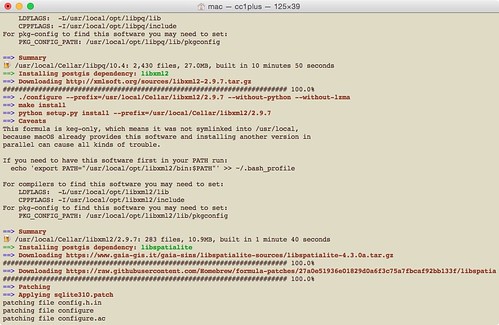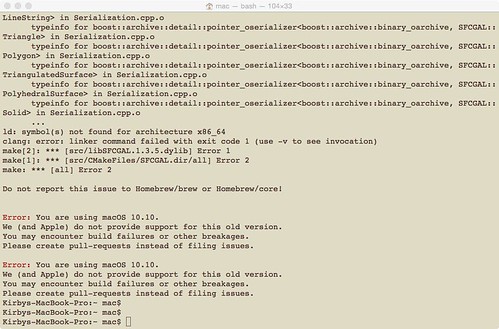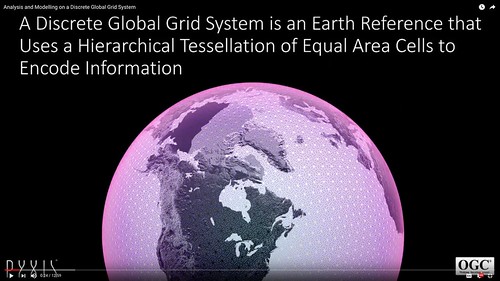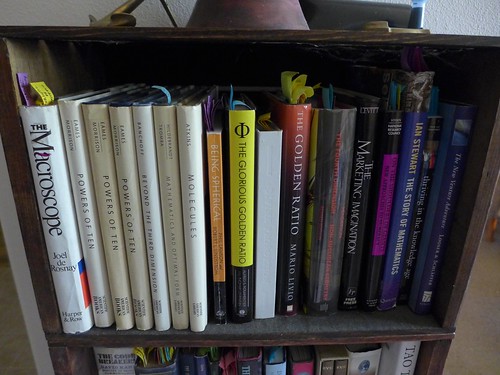Hah, hah, I'm making a punny joke, as actually I'm not making beer at home, but using a program called brew, for OS X, to install PostGIS, and it's taking a lot of time. Might as well blog about it right?
Quakers kept journals, not because they thought "I'm a big cheese" but because it's a therapeutic activity, at least for some of us. Many mental states have as their symptom some compulsion to write, and some of those states are considered lucrative to be in, or at least better than suffering from writers' block.
OK, lets decode some more:
OS X is the operating system running on contemporary (at the time of this writing) Apple machines. Last night in my course (I'm the instructor) I yakked about FreeBSD and Darwin, not Charles but rather:
x86_64-apple-darwin14.5.0
meaning the specific build of this operating system I'm currently using. I've not always been this much of an OS X user, having run my business atop Windows, and cut some chops in GNU World (Linux etc.). However I've been more an application layer programmer than any kind of kernel developer. I was not a computer science major. My focus was Liberal Arts, and philosophy in particular, which has its own angle on programming.
Engineers log their steps. Starship captains like Picard do the same. As do real ship captains, especially the exploring ones, sponsored to give thorough accounts.
That's George Picard of Star Trek fame. I was into that series when living in Bradenton, Florida and needing to still believe in some 24th Century, very EPCOT.
So here I am, a blend of the two: Quaker journal keeper and engineer logger, talking about installing PostGIS using Homebrew.
PostGIS is a fancy industrial strength open source database that's taking hours and hours to compile on my OS X. I teach a class in data science, which includes both data management and analysis, visualization. I'm showing off geopandas and basemap and other such tools of the DS / GIS trade. I cite VanderPlas quite a bit, as an effective teacher whom I'm learning from (lots of curriculum writing on-line).
There I go again, adding more abbreviations and acronyms. At this rate, we'll never be done decoding.
I re-upped on Grunch.net, a domain name I own, and portal into the Bucky stuff. That's Buckminster Fuller (he wasn't a vampire slayer, or depends on the namespace). His pithy Grunch of Giants is a perfect specimen of late 20th Century New England style transcendentalism. GRUNCH is another acronym to boot.
EPCOT = Experimental Prototype Community of Tomorrow (Disney's invention).
The installation process has gotten a lot further. 239 minutes and 55 seconds were required, could that be to compile gcc itself (8.1.0? -- I don't compile a lot in my present chapter, as Python precompiles to bytecode at runtime without requiring any explicit compile step).
This attempt to install PostGIS was abortive. No such luck. My version of OS X is too old. At one time, this OS was state of the art, and the homebrew script probably worked. But now they've moved on. The messages tell me not to report the issue, just fix it myself (I'm to create pull-requests with any bug fixes I may discover).
Possibly I got a working postgresql out of the deal? Homebrew lists it as being installed. I'll need to poke around a little more. I notice I have a new Python 2.7.







